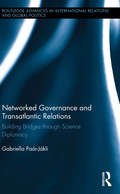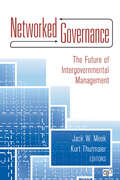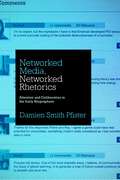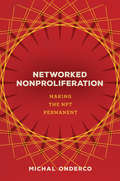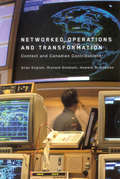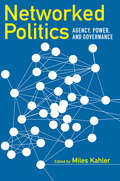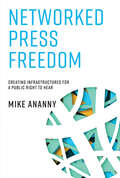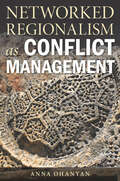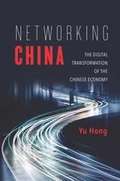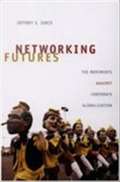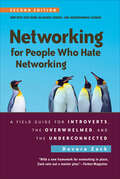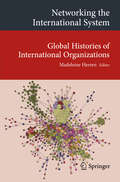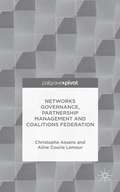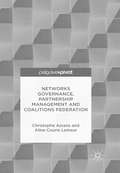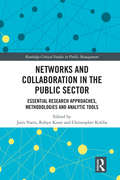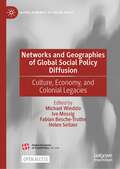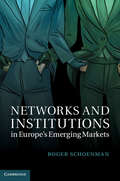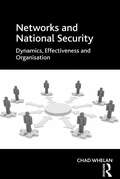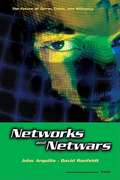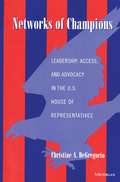- Table View
- List View
Networked Governance and Transatlantic Relations: Building Bridges through Science Diplomacy (Routledge Advances in International Relations and Global Politics)
by Gabriella Paar-JakliIn today’s complex and interconnected world, scholars of international relations seek to better understand challenges spurred by intensified global communication and interaction. The complex connectedness of modern society and politics compels us to investigate the pattern of interconnections among actors who inhabit social and political spaces. Gabriella Paár-Jákli's study aims to advance theory and practice by examining the networks used by specialists in North America and Europe to achieve their policy goals in the area of science and technology. Her book suggests that to overcome policy problems transnationally, three critical factors should be considered. First, as science and technology policy becomes increasingly critical to resolving global issues, it should be regarded as an integral element of the foreign policy process. Second, as liberal international relations theory argues, the increasing role of NGOs must be taken seriously alongside states as vital agents of policy reform. Third, as transatlantic relations remain center to maintaining the global order, they must be reconsidered. Paar-Jakli assesses the role of digital networks as facilitators of regional cooperation. Utilizing various techniques of social network analysis, her research indicates an active and structurally discernible network in cyberspace among transatlantic organizations, and demonstrates the role of virtual networks as facilitators of cooperative arrangements in transatlantic relations. Paár-Jákli's original research uses social network analysis to investigate transatlantic cooperation, a new approach that will be noteworthy to network and transatlantic scholars as well as policymakers.
Networked Governance: The Future Of Intergovernmental Management
by Jack W. Meek Kurt ThurmaierIn this unique contributed volume that features chapters written by top scholars paired with practitioner responses, students can see just how much the landscape of intergovernmental relations has evolved in recent years, with diminishing vertical flows of resources, and increased horizontal flows in the form of cross-jurisdictional and interlocal collaboration. Government at all levels must respond to increasing demands in both of these dimensions giving these contributors plenty to say about the future of intergovernmental management in such areas as: #65533; the changing role of managers, #65533; disaster response, #65533; social welfare spending, #65533; cross-boundary management, #65533; regional public-private partnerships, and #65533; sustainable cities. Contributors include Robert Agranoff, J. Edwin Benton, Beverly A. Cigler, Brian K. Collins, Mauricio Covarrubias, Raymond W. Cox II, John Kincaid, Christopher Koliba, William Lester, David Y. Miller, Beryl A. Radin, Juan M. Romero, and Eric S. Zeemering.
Networked Governance: The Future of Intergovernmental Management (Public Administration And Public Policy Ser.)
by Jack W. Meek Kurt ThurmaierIn a unique contributed volume that features chapters written by top scholars paired with practitioner responses, students can see just how much the landscape of intergovernmental relations has evolved in recent years, with diminishing vertical flows of resources, and increased horizontal flows in the form of cross-jurisdictional and interlocal collaboration. Contributors include Robert Agranoff, J. Edwin Benton, Beverly A. Cigler, Brian K. Collins, Mauricio Covarrubias, Raymond W. Cox II, John Kincaid, Christopher Koliba, William Lester, David Y. Miller, Beryl A. Radin, Juan M. Romero, and Eric S. Zeemering.
Networked Media, Networked Rhetorics: Attention and Deliberation in the Early Blogosphere (Rhetoric and Democratic Deliberation #10)
by Damien Smith PfisterIn Networked Media, Networked Rhetorics, Damien Pfister explores communicative practices in networked media environments, analyzing, in particular, how the blogosphere has changed the conduct and coverage of public debate. Pfister shows how the late modern imaginary was susceptible to “deliberation traps” related to invention, emotion, and expertise, and how bloggers have played a role in helping contemporary public deliberation evade these traps. Three case studies at the heart of Networked Media, Networked Rhetorics show how new intermediaries, including bloggers, generate publicity, solidarity, and translation in the networked public sphere. Bloggers “flooding the zone” in the wake of Trent Lott’s controversial toast to Strom Thurmond in 2002 demonstrated their ability to invent and circulate novel arguments; the pre-2003 invasion reports from the “Baghdad blogger” illustrated how solidarity is built through affective connections; and the science blog RealClimate continues to serve as a rapid-response site for the translation of expert claims for public audiences. Networked Media, Networked Rhetorics concludes with a bold outline for rhetorical studies after the internet.
Networked Media, Networked Rhetorics: Attention and Deliberation in the Early Blogosphere (Rhetoric and Democratic Deliberation)
by Damien Smith PfisterIn Networked Media, Networked Rhetorics, Damien Pfister explores communicative practices in networked media environments, analyzing, in particular, how the blogosphere has changed the conduct and coverage of public debate. Pfister shows how the late modern imaginary was susceptible to “deliberation traps” related to invention, emotion, and expertise, and how bloggers have played a role in helping contemporary public deliberation evade these traps. Three case studies at the heart of Networked Media, Networked Rhetorics show how new intermediaries, including bloggers, generate publicity, solidarity, and translation in the networked public sphere. Bloggers “flooding the zone” in the wake of Trent Lott’s controversial toast to Strom Thurmond in 2002 demonstrated their ability to invent and circulate novel arguments; the pre-2003 invasion reports from the “Baghdad blogger” illustrated how solidarity is built through affective connections; and the science blog RealClimate continues to serve as a rapid-response site for the translation of expert claims for public audiences. Networked Media, Networked Rhetorics concludes with a bold outline for rhetorical studies after the internet.
Networked Nonproliferation: Making the NPT Permanent
by Michal OndercoThe Treaty on Non-Proliferation of Nuclear Weapons (NPT) had many opponents when, in 1995, it came up for extension. The majority of parties opposed extension, and experts expected a limited extension as countries sought alternative means to manage nuclear weapons. But against all predictions, the treaty was extended indefinitely, and without a vote. Networked Nonproliferation offers a social network theory explanation of how the NPT was extended, giving new insight into why international treaties succeed or fail. The United States was the NPT's main proponent, but even a global superpower cannot get its way through coercion or persuasion alone. Michal Onderco draws on unique in-depth interviews and newly declassified documents to analyze the networked power at play. Onderco not only gives the richest account yet of the conference, looking at key actors like South Africa, Egypt, and the EU, but also challenges us to reconsider how we think about American power in international relations. With Networked Nonproliferation, Onderco provides new insight into multilateral diplomacy in general and nuclear nonproliferation in particular, with consequences for understanding a changing global system as the US, the chief advocate of nonproliferation and a central node in the diplomatic networks around it, declines in material power.
Networked Operations and Transformation: Context and Canadian Contributions
by Richard Gimblett Howard Coombs Allan EnglishThe authors consider various approaches to networked operations that are based on the physical environment and cultural context in which armed forces operate. They conclude that a "one size fits all" approach to command and control for networked operations may not be the most effective and suggest a more human-centric approach than the primarily technology-centred model used by the U.S. military.
Networked Politics: Agency, Power, and Governance
by Miles KahlerThe concept of network has emerged as an intellectual centerpiece for our era. Network analysis also occupies a growing place in many of the social sciences. In international relations, however, network has too often remained a metaphor rather than a powerful theoretical perspective. In Networked Politics, a team of political scientists investigates networks in important sectors of international relations, including human rights, security agreements, terrorist and criminal groups, international inequality, and governance of the Internet. They treat networks as either structures that shape behavior or important collective actors. In their hands, familiar concepts, such as structure, power, and governance, are awarded new meaning. Contributors: Peter Cowhey, University of California, San Diego; Mette Eilstrup-Sangiovanni, University of Cambridge and Sidney Sussex College; Zachary Elkins, University of Texas at Austin; Emilie M. Hafner-Burton, Princeton University; Miles Kahler, University of California, San Diego; Michael Kenney, Pennsylvania State University; David A. Lake, University of California, San Diego; Alexander H. Montgomery, Reed College; Milton Mueller, Syracuse University School of Information Studies and Delft University of Technology; Kathryn Sikkink, University of Minnesota; Janice Gross Stein, University of Toronto; Wendy H. Wong, University of Toronto; Helen Yanacopulos, Open University
Networked Press Freedom: Creating Infrastructures for a Public Right to Hear
by Mike AnannyReimagining press freedom in a networked era: not just a journalist's right to speak but also a public's right to hear. In Networked Press Freedom, Mike Ananny offers a new way to think about freedom of the press in a time when media systems are in fundamental flux. Ananny challenges the idea that press freedom comes only from heroic, lone journalists who speak truth to power. Instead, drawing on journalism studies, institutional sociology, political theory, science and technology studies, and an analysis of ten years of journalism discourse about news and technology, he argues that press freedom emerges from social, technological, institutional, and normative forces that vie for power and fight for visions of democratic life. He shows how dominant, historical ideals of professionalized press freedom often mistook journalistic freedom from constraints for the public's freedom to encounter the rich mix of people and ideas that self-governance requires. Ananny's notion of press freedom ensures not only an individual right to speak, but also a public right to hear. Seeing press freedom as essential for democratic self-governance, Ananny explores what publics need, what kind of free press they should demand, and how today's press freedom emerges from intertwined collections of humans and machines. If someone says, “The public needs a free press,” Ananny urges us to ask in response, “What kind of public, what kind of freedom, and what kind of press?” Answering these questions shows what robust, self-governing publics need to demand of technologists and journalists alike.
Networked Regionalism as Conflict Management
by Anna OhanyanMost regions of the world are plagued by conflicts that are made insoluble by a confluence of complex threads from history, geography, politics, and culture. These "frozen conflicts" defy conflict management interventions by both internal and external agents and institutions. Worse, they constantly threaten to extend beyond their local geographies, as in the terrorist bombings in Boston by ethnic Chechens, or to escalate from skirmishes to full-scale war, as in Nagorno-Karabakh. Consequently, such conflicts cry out for alternative approaches to the classic, state-focused, and sovereignty-based conflict management models that are practiced in traditional diplomacy--which most often produce rather short-term, ad hoc, fragmented interventions and outcomes. Drawing upon the cases of the South Caucasus, the Western Balkans, Central America, South East Asia, and Northern Ireland, Networked Regionalism as Conflict Management offers a theoretical and practical solution to this impasse by arguing for regional collective interventions that involve a long-term reengineering of existing conflict management infrastructure on the ground. Such approaches have been attracting the attention of scholars and practitioners alike yet, thus far, these concepts have rarely involved more than simple prescriptions for regional cooperation between grassroots actors and traditional diplomacy. Specifically, says Anna Ohanyan, only the cultivation and establishment of regional peace systems can provide an effective path toward conflict management in these standoffs in such intractably divided regions.
Networking China: The Digital Transformation of the Chinese Economy (The Geopolitics of Information)
by Yu HongIn recent years, China 's leaders have taken decisive action to transform information, communications, and technology (ICT) into the nation's next pillar industry. In Networking China , Yu Hong offers an overdue examination of that burgeoning sector's political economy. Hong focuses on how the state, in conjunction with market forces and class interests, is constructing and realigning its digitalized sector. State planners intend to build a more competitive ICT sector by modernizing the network infrastructure, corporatizing media-and-entertainment institutions, and by using ICT as a crosscutting catalyst for innovation, industrial modernization, and export upgrades. The goal: to end China's industrial and technological dependence upon foreign corporations while transforming itself into a global ICT leader. The project, though bright with possibilities, unleashes implications rife with contradiction and surprise. Hong analyzes the central role of information, communications, and culture in Chinese-style capitalism. She also argues that the state and elites have failed to challenge entrenched interests or redistribute power and resources, as promised. Instead, they prioritize information, communications, and culture as technological fixes to make pragmatic tradeoffs between economic growth and social justice.
Networking Futures: The Movements Against Corporate Globalization
by Jeffrey S. JurisSince the first worldwide protests inspired by Peoples' Global Action (PGA)--including the mobilization against the November 1999 World Trade Organization meetings in Seattle--anti-corporate globalization activists have staged direct action protests against multilateral institutions in cities such as Prague, Barcelona, Genoa, and Cancun. Barcelona is a critical node, as Catalan activists have played key roles in the more radical PGA network and the broader World Social Forum process. In 2001 and 2002, the anthropologist Jeffrey S. Juris participated in the Barcelona-based Movement for Global Resistance, one of the most influential anti-corporate globalization networks in Europe. Combining ethnographic research and activist political engagement, Juris took part in hundreds of meetings, gatherings, protests, and online discussions. Those experiences form the basis of Networking Futures, an innovative ethnography of transnational activist networking within the movements against corporate globalization. In an account full of activist voices and on-the-ground detail, Juris provides a history of anti-corporate globalization movements, an examination of their connections to local dynamics in Barcelona, and an analysis of movement-related politics, organizational forms, and decision-making. Depicting spectacular direct action protests in Barcelona and other cities, he describes how far-flung activist networks are embodied and how networking politics are performed. He further explores how activists have used e-mail lists, Web pages, and free software to organize actions, share information, coordinate at a distance, and stage "electronic civil disobedience. " Based on a powerful cultural logic, anti-corporate globalization networks have become models of and for emerging forms of radical, directly democratic politics. Activists are not only responding to growing poverty, inequality, and environmental devastation; they are also building social laboratories for the production of alternative values, discourses, and practices.
Networking for People Who Hate Networking: A Field Guide For Introverts, the Overwhelmed, and the Underconnected
by Devora ZackWould you rather get a root canal than face a group of strangers? Does the phrase &“working a room&” make you want to retreat to yours? Devora Zack, an avowed introvert and successful consultant who gives presentations to thousands of people at dozens of events annually, feels your pain. She found that other networking books assume that to succeed, you have to act like an extrovert. Not at all. There is another way. Zack politely examines and then smashes to tiny fragments the &“dusty old rules&” of standard networking advice. She shows how the very traits that make many people hate networking can be harnessed to forge an approach more effective and user-friendly than traditional techniques. This edition adds new material on applying networking principles in personal situations, handling interview questions, following up—what do you do with all those business cards?—and more. Networking enables you to accomplish the goals that are most important to you. But you can't adopt a style that goes against who you are—and you don't have to. As Zack writes, &“You do not succeed by denying your natural temperament; you succeed by working with your strengths.&”
Networking the International System
by Madeleine HerrenThe book critically investigates the local impact of international organizations beyond a Western rationale and aims to overcome Eurocentric patterns of analysis. Considering Asian and Western examples, the contributions originate from different disciplines and study areas and discuss a global approach, which has been a blind spot in scholarly research on international organizations until now. Using the 1930s as a historical reference, the contributions question role of international organizations during conflicts, war and crises, gaining insights into their function as peacekeeping forces in the 21st century. While chapter one discusses the historicity of international organizations and the availability of sources, the second chapter deliberates on Eurocentrism and science policy, considering the converging of newly created epistemic communities and old diplomatic elites. Chapter 3 sheds light on international organizations as platforms, expanding the field of research from the diversity of organizations to the patterns of global governance. The final chapter turns to the question of how international organizations invented and introduced new fields of action, pointing to the antithetic role of standardization, the preservation of cultural heritage and the difficulties in reaching a non-Western approach.
Networks Governance, Partnership Management and Coalitions Federation
by Christophe Assens Aline Courie LemeurNetworks Governance, Partnership Management and Coalitions Federation
Networks Governance, Partnership Management and Coalitions Federation (Governance and Public Management)
by Christophe Assens Aline Courie LemeurThis book explores the governance of networks. A network's governance mechanisms are based on trust and confidence, which go beyond a simple economic logic. As the network's boundaries expand to include clusters of businesses and stakeholders and the emergence of coalitions of all kinds, the trust will gradually dilute and the network's unifying role will be lost. The organization then evolves into the form of a network of networks, where the challenge is to bring together coalitions. Using examples from the European Union and the Regional Health Federation of Networks, this book explores the political and socio-economic challenges, including the decision making and division of tasks, faced by network organizations which move to a federation model of governance.
Networks Of Dissolution: Somalia Undone
by Anna SimonsIn this penetrating and timely book, Anna Simons documents Somalia's impending slide toward anarchy. How do people react to a failing yet still repressive government? What do they do when the banks run out of cash? How do they cope with unprecedented uncertainty? These are some of the questions Simons addresses as she introduces the reader to Somal
Networks and Collaboration in the Public Sector: Essential research approaches, methodologies and analytic tools (Routledge Critical Studies in Public Management)
by Robyn Keast Joris Voets Christopher KolibaNetworks and other collaborations are central to the public sector’s ability to respond to their diverse responsibilities, from international development and regional governance, to policy development and service provision. Great strides have been made toward understanding their formation, governance and management, but more opportunities to explore methodologies and measures is required to ensure they are properly understood. This volume showcases an array of selected research methods and analytics tools currently used by scholars and practitioners in network and collaboration research, as well as emerging styles of empirical investigation. Although it cannot attempt to capture all technical details for each one, this book provides a unique catalogue of compelling methods for researchers and practitioners, which are illustrated extensively with applications in the public and non-profit sector. By bringing together leading and upcoming scholars in network research, the book will be of enormous assistance in guiding students and scholars in public management to study collaboration and networks empirically by demonstrating the core research approaches and tools for investigating and evaluating these crucially important arrangements.
Networks and Geographies of Global Social Policy Diffusion: Culture, Economy, and Colonial Legacies (Global Dynamics of Social Policy)
by Michael Windzio Ivo Mossig Fabian Besche-Truthe Helen SeitzerThis open access book analyses the global diffusion of social policy as a process driven by multiplex ties between countries in global social networks. The contributions analyze links between countries via global trade, colonial history, similarity in culture, and spatial proximity. Networks are viewed as the structural backbone of the diffusion process, and diffusion is anlaysed via several subfields of social policy, in order to interrogate which network dimensions drive this process. The focus is on a global perspective of social policy diffusion via networks, and it is the first book to explicitly follow this macro-quantitative perspective on diffusion at a global scale whilst also comparing different networks. The collection tests the network structures in terms of their relevance to the diffusion process in different subfields of social policy such as old age and survivor pensions, labor and labor markets, health and long-term care, education and training, and family and gender policy.The book will therefore be invaluable to students and researchers of global social policy, sociology, political science, international relations, organization theory and economics.
Networks and Institutions in Europe's Emerging Markets
by Roger SchoenmanDo ties between political parties and businesses harm or benefit the development of market institutions? The post-communist transition offers an unparalleled opportunity to explore when and how networks linking the polity and the economy support the development of functional institutions. A quantitative and qualitative analysis covering eleven post-socialist countries combined with detailed case studies of Bulgaria, Poland and Romania documents how the most successful post-communist countries are those in which dense networks link politicians and businesspeople, as long as politicians are constrained by intense political competition. The comparison of original network data sets shows how this combination allowed Poland to emerge with stable institutions. Bulgaria, marred by weak institutions, corruption and violence, cautions us that in developing economies intense political competition alone is harmful in the absence of dense personal and ownership networks. Indeed, as Romania illustrates, networks are so critical that their weakness is not mitigated even by low political competition.
Networks and National Security: Dynamics, Effectiveness and Organisation
by Chad WhelanNetworks as sets of autonomous organisations working together to achieve individual and shared goals are becoming increasingly important across many areas of public administration. The importance of networks is well known but most analysts would agree that we do not know enough about the dynamics and effectiveness of networks in relation to their internal operations. This is a significant problem as security, intelligence, law enforcement and many other agencies are increasingly required to organise in and through networks to provide national security. In this comprehensive analysis, Chad Whelan presents a highly innovative, qualitative study of networks in the field of national security. Developing our understanding of 'organisational networks' in organisational theory, management and public administration, and 'security networks' in criminology and international relations, he presents a multi-disciplinary analysis of network forms of organisation. Whelan puts forward a methodological framework involving five levels of analysis - structural, cultural, policy, technological and relational - with which we can better analyse and understand the dynamics and effectiveness of networks. This framework is applied to public sector networks operating in the field of counter-terrorism in Australia in a way that is highly relevant to researchers and practitioners in many contexts where government departments and agencies, and the private sector, need to work together. Networks and National Security: Dynamics, Effectiveness and Organisation not only advances our knowledge of networks and national security but also assists with the essential tasks of evaluating and managing networks. Written in a clear and accessible style and featuring a wealth of first-hand accounts concerning the inside operations of networks, this book deals with the crucial subject of inter-agency coordination in the important field of national security.
Networks and Netwars
by David Ronfeldt John ArquillaNetwar-like cyberwar-describes a new spectrum of conflict that is emerging in the wake of the information revolution. Netwar includes conflicts waged, on the one hand, by terrorists, criminals, gangs, and ethnic extremists; and by civil-society activists (such as cyber activists or WTO protestors) on the other. What distinguishes netwar is the networked organizational structure of its practitioners-with many groups actually being leaderless-and their quickness in coming together in swarming attacks. To confront this new type of conflict, it is crucial for governments, military, and law enforcement to begin networking themselves.
Networks for Water Policy: A Comparative Perspective (Routledge Library Editions: Water Resources)
by Hans Bressers Jeremy Richardson Laurence J. O’Toole JrNetwork models for analysing public policy have become widely used in recent years. This volume, originally published in 1995, assesses the network idea by applying a common perspective on network analysis to the constellations involved in water policy formation and implementation in England and Wales, Germany, Hungary, the Netherlands, the USA and at the level of the EU. Water policy – addressing basic human needs for the supply of adequate surface and groundwater as well as for the maintenance and improvement of water quality, is an increasingly salient subject. Each case covered in this volume treats the issues of water policy network composition and structure, and determinants of network characteristics, as well as documenting the influence of the networks on policy developments towards more network openness, emulation of business behaviour nd less domination by traditional professional groups such as engineers. Essays by the editors provide a common analytical perspective and offer both explicitly-comparative conclusions and evidence-based assessments of the strengths and limitations of the network perspective.
Networks of Champions
by Christine A. DegregorioMedia accounts of Congress emphasize conflict and the failure of Congress to enact legislation. Rarely do we see accounts of the successful efforts of members of Congress and outside advocacy groups to pass legislation dealing with important and controversial issues. InNetworks of ChampionsChristine A. DeGregorio identifies who in the U. S. House of Representatives took the lead in shepherding six major bills, dealing with welfare reform, drug control, international trade, farm policy, nuclear weapons testing, and assistance to the Contras, through Congress and how these champions of legislation worked with outside advocacy groups. DeGregorio finds that the champions of this legislation were drawn from a diverse group that included individuals both within and outside the formal hierarchy of leadership. The champions, who were not necessarily the prominent holders of important positions, are characterized by having knowledge of the subject matter, experience in the House, a facility for bargaining and compromise, the right committee assignments, and a commitment to hard work. DeGregorio traces how these groups become influential and how the groups affect the policy-making process. She finds a reciprocal process in which advocacy groups use champions to express their views while champions use the resources of advocacy groups to gain influence in the House. Based on extensive interviews with key congressional staff members and the leaders of advocacy groups, DeGregorio provides critical new insights into the legislative process. This book will be of interest to those who study the legislative process and the role of interest groups in making American policy. ". . . a substantial contribution to our understanding of advocacy in Congress. " --Barbara Sinclair, University of California, Los Angeles Christine A. DeGregorio is Associate Professor, Department of Government, School of Public Affairs, American University.
Networks of Nations
by Zeev MaozMaoz views the evolution of international relations over the last two centuries as a set of interacting, cooperative and conflicting networks of states. The networks that emerged are the result of national choice processes about forming or breaking ties with other states. States are constantly concerned with their security and survival in an anarchic world. Their security concerns stem from their external environment and their past conflicts. Because many of them cannot ensure their security by their own power, they need allies to balance against a hostile international environment. The alliance choices made by states define the structure of security cooperation networks and spill over into other cooperative networks, including trade and institutions. Maoz tests his theory by applying social networks analysis (SNA) methods to international relations. He offers a novel perspective as a system of interrelated networks that co-evolve and interact with one another.
